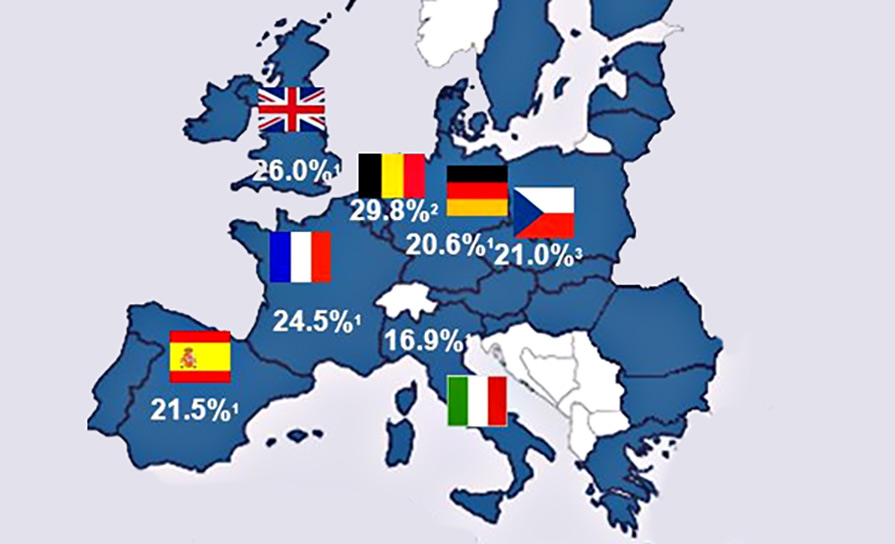Psychologist or psychiatrist? Why you need both in your neurology service
For many health professionals, as well as among the public, the roles of psychology and psychiatry are often unclear and difficult to distinguish. In addition, the relationship between psychology and psychiatry has historically been complex and sometimes conflictual (Costello and Angold, 2014). This review will discuss the distinguishing and complementary roles of psychology and psychiatry, and their contributions to neuroscientific understanding and treatments. This may be of particular relevance in medical settings, such as neurology clinics, where a biomedical or structural approach often predominates.
A shared goal for both psychiatrists and psychologists is the improved health outcomes that result from enhanced emotional and mental well-being, through research and the application of this research in clinical interventions.
Psychiatry is the branch of medicine focused on the diagnosis, treatment and prevention of mental, emotional and behavioral disorders (American Psychiatry Association, n.d.).
Psychology is the study of the mind and behaviour (American Psychological Association, n.d.). This discipline is concerned with all aspects of the human experience and behaviour, from normal everyday human actions to mental illness, from the functions of the brain to the behaviours of societies.
Psychologists and psychiatrists have different educational backgrounds, training, and scope of practice, with interrelated and complementary areas of expertise.
Psychiatry
In terms of professional practice, psychiatrists are medical doctors specialising in mental illnesses. Psychiatrists receive the same undergraduate medical training as surgeons and neurologists, acquiring knowledge in all of the systems and functions of the human body, history and physical examination skills, and specific treatment plans for each medical condition. To become a consultant psychiatrist in Ireland, a four-year basic specialist training (BST) experience and success in Membership examinations is followed by a minimum three years in higher specialist training (HST). This training includes specialism in psychotropic prescribing, as well as psychotherapy training such as cognitive behaviour therapy (CBT) techniques, and is often followed by further training through specialisation in areas such as adolescent, forensic or neuropsychiatry.
Psychology
Unlike psychiatrists, clinical psychologists start with a primary university (non-medical) degree, typically either a BA or BSc, before going onto postgraduate courses that typically include a one-/two-year Masters in a field of psychology (eg applied, health or forensic) and a further three-year doctoral degree. The doctoral degree focuses on training in psychological assessment and interventions. An additional difference in training relates to the extensive grounding in research skills acquired, which enables psychologists to address a wide range of empirical research questions, such as the impact of interventions or aetiological and mediating factors underlying psychological problems (Reynolds et al, 2009).
Working relationship
Both professions are often found working in similar settings and with many of the same patients as psychiatrists. While psychiatrists have expertise in pharmacologically-based treatments and the general medical context, clinical psychologists often highlight their particular expertise in formulation of difficulties, psychosocial interventions and the psychosocial context, and are trained in the use of standardised, psychometric tools for assessment of psychopathology, maladaptive personality traits and cognitive complaints (Trivedi and Goel, 2006).
Issues such as severity of mental health difficulty and risk of harm to oneself or others may also indicate need for psychiatric intervention. Both of these areas of expertise are necessary for holistic and individualised interventions based on patient needs. Psychotropic medication can be essential in reducing symptom severity burden in the more severe and debilitating mental health conditions, whilst psychotherapy is typically recommended to address the underlying causes of symptoms. A helpful analogy might be the role of insulin for some patients with diabetes, whilst self-management and lifestyle management tools are essential for all. For many cases of adjustment difficulties or emotional distress, psychosocial intervention is preferred to psychotropic medication (Saddichha and Chaturvedi, 2014).
In medical and mental health settings, psychiatrists tend to have more authority and greater decision-making power, particularly in their role as consultants (Costello and Angold, 2014) and also in terms of their role under the Mental Health Act involving deciding on involuntary admissions to hospital. MacLachlan (2020) also argued that this medical and psychiatric dominance is institutionalised through leadership of multidisciplinary teams (MDT). Yet, in some other countries including the UK, co-leadership of MDTs across the professions is the common practice, based on competence rather than profession (Tyson et al, 2014).
The challenge is how we move away from a hierarchical approach to interdisciplinary team-working, whilst developing clinical governance structures that support this. Additionally, confusion about the difference between the roles can lead to resource-based decision making into choosing either psychology or psychiatry for a service, rather than sessional contribution from both.
The challenge is how we move away from a hierarchical approach to interdisciplinary team-working, whilst developing clinical governance structures that support this
Challenges
Both professions also face conceptual and practical challenges. Although it has been argued that psychiatry is disadvantaged by a reliance on categorical diagnostic systems (ie, DSM/ICD) to categorise emotional distress, the fact that resourcing in current healthcare systems is largely based on diagnoses means that there are no valid alternatives at present. On the other hand, psychology emphasises a more dimensional and multi-factorial formulation rather than categorical diagnoses per se. Psychology also disavows the role of ‘expert’ and expert pronouncements like a medical diagnosis, by instead emphasising collaborative working with clients (Oades, Crowe, and Nguyen, 2009).
Critics have argued that because a great deal of psychological research is based on research designs that involve the study of groups of individuals, it cannot be applied to working with an individual case. For this reason, psychotherapy is said to be as much art as science (Hofmann and Weinberger, 2007).
Furthermore, the strength of the evidence-base for interventions varies across conditions. Factors such as the therapist-client relationship is key in affecting therapeutic outcomes, but this is difficult to accurately measure and varies widely across practitioners (Castonguay and Butler, 2006). Some individuals, including those with significant cognitive impairment, are not suitable for in-depth psychotherapy, which requires the metacognitive and linguistic capacity for self-reflection and self-awareness, adequate ego-strength to tolerate difficult emotions and readiness to take personal responsibility for change.
Mind-body problem
Both professions have a valuable role in enhancing understanding of the mind-body problem, ie, the extent to which the mind, brain and body are interconnected, often mediated by autonomic nervous system dysfunction. This is particularly useful for patient groups with psychosomatic and functional neurological difficulties, which is a common diagnosis in patients presenting in neurology outpatient clinics (Stone, 2016; Edwards and Bhatia 2012).
Among this group, symptoms are often said to be ‘medically unexplained’, which leads to a misinformed view that problems are ‘all in the mind’. The Cartesion differentiation of disorders into physical ‘real’ and mental ‘imaginary’ is not a useful dichotomy, as discoveries relating to the mechanisms and development of the central nervous system, along with increasing understanding of the contributory role of immunological and inflammatory systems and the microbiome, are gradually traversing the mind-body and mind-brain divides (Zemen, 2020; Cullen et al, 2020).
Psychiatry in particular, has an advantage of being at the interface of several disciplines which can facilitate a unique understanding of mind and body. It is grounded in neurology, medicine, epidemiology and the psychosocial sciences (Roiser, 2015). In particular, the techniques of neuroscience (ie, research into the aetiology and pathophysiology of brain dysfunction) are providing a more sophisticated understanding of the causal pathways to major mental health problems (Reynolds et al, 2009; van Dongen and Franken, 2019).
Psychology can also help guide the neuroscience with appropriate and relevant assessments, eg, determining the neural substrates of cognitive, perceptual and affective processes that underpin behaviour and relationship functioning. Psychology can also inform theoretical interpretation of findings. For example, cognitive profiling of family members of those with neurological or neuropsychiatric conditions can help identify candidate genes for complex psychiatric disorders such as psychosis (Bilder et al, 2009).
Clinical neuropsychologists have a key role in the early detection and characterisation of neurological conditions in which cognitive and emotional dysfunction are key criteria, by identifying distinct ‘patterns’ of cognitive or affective alterations that correspond to established dementing and neuropsychiatric conditions (Braun et al, 2011). Neuroscientific advancements have profound implications for the future of both professions.
Biopsychosocial model
Both disciplines now broadly acknowledge the bio-psycho-social (Engel, 1980) model of mental health difficulties, it is also posited that psychology in particular, has contributed significantly to the elucidation and understanding of perceptual, motor, cognitive, social and behavioural capabilities and interpersonal variations such as temperament and attachment (Lehman et al, 2017). The fundamental goal of the biopsychosocial model is to prevent reductionism, particularly biological reductionism, by emphasising the significant roles of psychological and social factors in emotional dysfunction (Henderson and Martin, 2014).
The adoption of the biopsychosocial approach is widely advocated for clinical encounters and considered necessary for a holistic response to the individuals’ suffering and community health needs. Given their understanding of how the interactions of the mind, brain and body generate dysfunction, psychology and psychiatry play significant and complementary roles in medical and mental health settings (Wahass, 2005).
Collaboration
Therefore, a collaborative team approach with physicians, psychiatrists, psychologists and other allied health professionals addressing both physical symptoms and emotional needs is advocated to improve patient outcomes (Perry and Streusad, 2013), emphasising inter-disciplinary team working rather than a hierarchical approach dominated by the medical profession/model. As such, it is critical that a stronger psychosocial approach is adopted in medical settings, and is adequately reflected in the composition of the oversight and implementation groups for the next iteration of Ireland’s mental health strategy. This approach was also highlighted in the editorial address of the British Journal of Psychiatry (BJP) 20 years ago (Eisenberg, 2000), and this statement remains relevant today:
“Biomedical knowledge is essential for providing sound medical care, but it is not sufficient. The nature of dysfunctions and the physicians’ transaction with the patient must also be informed by the psychosocial understanding.
“Neither the mindless nor the brainless can be tolerated in medicine” (Eisenberg, 2000).
References on request












Leave a Reply
You must be logged in to post a comment.